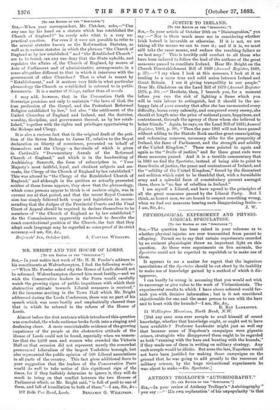JUSTICE TO IRELAND.
[To THE EDITOR OF THE "Bescr,To...."] SIR,—In your article of October 20th on "Disintegration," you say :—" Nor is there much more use in considering whether Irish hatred is incurable or otherwise. If it is not, we are taking all the means we can to cure it; and if it is, we must still take the same means, and endure the resulting failure as we best may." This is terribly cold comfort to all those who have been induced to follow the lead of the authors of the great measures passed to conciliate Ireland. Hear Mr. Bright on the Church Disestablishment Bill of 1869 (Annual Register, 1869, p. 37) :—" I say when I look at this measure, I look at it as tending to a more true and solid union between Ireland and Great Britain. I see it giving tranquillity to our people." Hear Mr. Gladstone on the Land Bill of 1870 (Annual Register 1870, p. 39) :—" Hesitate, then, I beseech you, for a moment before you run the risk of lighting a flame which you will in vain labour to extinguish, lest it should be the un- happy fate of your country that after she has surmounted every difficulty, borne every calamity, and conquered every enemy, she should at length miss the prize of national peace, happiness, and contentment, through the agency of those whom she believed to beher friends." Again, be says, on the Land Bill of 1881(Annual Register, 1881, p. 99), "Then the year 1881 will not have passed without adding to the Statute Book another great emancipating and redeeming measure, necessary alike for the prosperity of Ireland, the fame of Parliament, and the strength and solidity of the United Kingdom." These were pointed to again and again as the "fruits of justice," and for these great ends were those measures passed. And it is a terrible commentary that in 1883 we find the Spectator, instead of being able to point to these fruits of justice, the peace and contentment of Ireland, and the "solidity of the United Kingdom," forced by the discontent and sedition which exist to be thankful that, with a formidable army and a splendid force of constabulary present amongst them, there is "no fear of rebellion in Ireland."
I am myself a Liberal, and have agreed to the principles of all the great measures passed by the Liberal Party. But I think, as honest men, we are bound to suspect something wrong, when we find our measures bearing such disappointing fruits.—


































 Previous page
Previous page